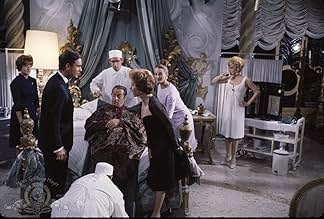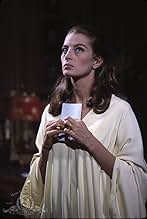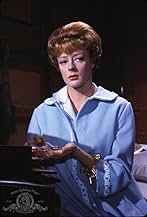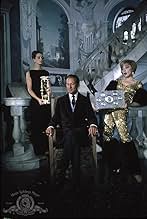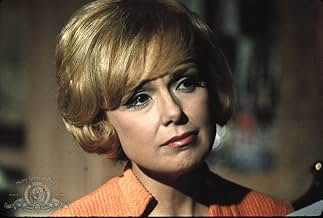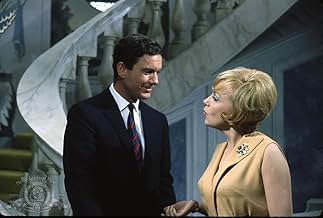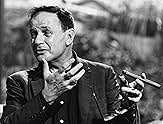VALUTAZIONE IMDb
6,7/10
3180
LA TUA VALUTAZIONE
Aggiungi una trama nella tua linguaIn Venice, a millionaire hires an actor to help him prank three greedy ex-girlfriends into thinking he's dying and leaving his fortune to one of them.In Venice, a millionaire hires an actor to help him prank three greedy ex-girlfriends into thinking he's dying and leaving his fortune to one of them.In Venice, a millionaire hires an actor to help him prank three greedy ex-girlfriends into thinking he's dying and leaving his fortune to one of them.
- Regia
- Sceneggiatura
- Star
Herschel Bernardi
- Oscar Ludwig
- (scene tagliate)
Massimo Serato
- The Pretender
- (scene tagliate)
Jack Benny
- Violinist outside restaurant
- (non citato nei titoli originali)
Mimmo Poli
- Cook
- (non citato nei titoli originali)
Luigi Scavran
- Massimo
- (non citato nei titoli originali)
Recensioni in evidenza
A very rich man sets up a scheme to convince 3 old lovers that he is dying and they - individually - are potentially his heir. Good performances by Harrison, Robertson and Maggie Smith. An end worthy of Agatha Christie - with all the players brought together and the details brought out.
This is a very good film adaptation of a story that has had a number of permutations. The original source of the story dates to British poet and playwright Ben Jonson's (1572-1637) satirical play, "Volpone." Thomas Sterling's "Evil of the Day" was a 1955 novel, and playwright Frederick Knott then adapted that source into the play, "Mr. Fox of Venice."
The theme of the original work is carried through all the renditions of the story. It's a biting satire on greed, with a complex staged practical joke as the main plot. The comedy isn't of the rollicking laughter type, but in the exaggerations with the drama and the characters themselves. Most of the characters of the Ben Jonson play are carried through all renditions, except that in the 20th century story the three characters of avarice are women instead of men.
Director Joseph Mankiewicz does a masterly job of adapting and then directing the story, with an introduction and closing comments in voice over by the main character, Cecil Fox. He uses this technique very subtly for one other character toward the end. Another reviewer delighted in what he called the "Maltese Falcon" ending. It is fantastic in itself.
The film was made mostly in Rome, with some canal scenes shot in Venice. The producers assembled a first-rate cast to play the diverse roles. All give performances worthy of academy award nominations. Rex Harrison is superb as Cecil Fox, and Susan Hayward dominates her scenes as Mrs. Sheridan - Fox's "Lone Star" mistress from the past. Cliff Robertson adds enough mystery to his dutiful and slyly charming role as William McFly. A nearly 40 Capucine still radiates the sophisticated beauty for which she was known, here playing Princess Dominique. And Maggie Smith shows for the first time on film her deftness for deadpan humor. Her nurse Sarah Watkins is both demure, suspicious and slightly sly.
Adolfo Celi is very good as Inspector Rizzi, who plays some scenarios superbly for comedy. The scenes in his home are hilarious where his family members are glued to the TV watching a Perry Mason mystery show. The Italian voice-over for Raymond Burr's Mason is hilarious - a high-pitched male voice coming out of the tube when Perry speaks.
But the star who provides most of the laughter in "The Honey Pot" is Edie Adams. She plays Merle McGill, an otherwise attractive movie star who, underneath, is little more than a ditzy blonde and opportunist. She was someone Fox picked up off the street years before and turned into a movie icon.
Here are some favorite lines form this film.
Inspector Rizzi, "Miss McGill, I understand the necessity of you to arrive in Venice incognito." Merle McGill, "I wouldn't go anywhere (sic) uninvited." Inspector Rizzi, "I must have used the wrong word. My English is uh...." Merle McGill, "It must be hard for you to imagine, inspector - a man like Cecil Fox and I." Inspector Rizzi, "Not hard at all." McGill, "How can I say it, inspector? He was my first... man. Somehow, you just never forget your first man." Rizzi, "I remember mine, vividly. He also got away."
Merle McGill, "OK, shamus, so what's on your mind? Or, to be exact, on both your minds?" Inspector Rizzi, "Shamus? You use too many American idioms I do not know."
Merle McGill, "When you do talk to Princess Dominique, you know what she's gonna tell ya?" Inspector Rizzi, "If I had such capability, I would never get out of bed." McGill, "She's gonna say that she and I were here, in my room, all night, playing gin rummy together. That'll be a lie. For one thing, she can't even play gin rummy." Rizzi, "Fascinating! Now why would she choose a game she could not play?" McGill, with a "caught" look on her face, "Yeah, that was stupid of her, but the name of the game isn't important."
Princess Dominique, "I have no need for Mr. Fox's money." Inspector Rizzi, "That is what truly baffles me. This incredible wealth which nobody needs and everybody wants."
The theme of the original work is carried through all the renditions of the story. It's a biting satire on greed, with a complex staged practical joke as the main plot. The comedy isn't of the rollicking laughter type, but in the exaggerations with the drama and the characters themselves. Most of the characters of the Ben Jonson play are carried through all renditions, except that in the 20th century story the three characters of avarice are women instead of men.
Director Joseph Mankiewicz does a masterly job of adapting and then directing the story, with an introduction and closing comments in voice over by the main character, Cecil Fox. He uses this technique very subtly for one other character toward the end. Another reviewer delighted in what he called the "Maltese Falcon" ending. It is fantastic in itself.
The film was made mostly in Rome, with some canal scenes shot in Venice. The producers assembled a first-rate cast to play the diverse roles. All give performances worthy of academy award nominations. Rex Harrison is superb as Cecil Fox, and Susan Hayward dominates her scenes as Mrs. Sheridan - Fox's "Lone Star" mistress from the past. Cliff Robertson adds enough mystery to his dutiful and slyly charming role as William McFly. A nearly 40 Capucine still radiates the sophisticated beauty for which she was known, here playing Princess Dominique. And Maggie Smith shows for the first time on film her deftness for deadpan humor. Her nurse Sarah Watkins is both demure, suspicious and slightly sly.
Adolfo Celi is very good as Inspector Rizzi, who plays some scenarios superbly for comedy. The scenes in his home are hilarious where his family members are glued to the TV watching a Perry Mason mystery show. The Italian voice-over for Raymond Burr's Mason is hilarious - a high-pitched male voice coming out of the tube when Perry speaks.
But the star who provides most of the laughter in "The Honey Pot" is Edie Adams. She plays Merle McGill, an otherwise attractive movie star who, underneath, is little more than a ditzy blonde and opportunist. She was someone Fox picked up off the street years before and turned into a movie icon.
Here are some favorite lines form this film.
Inspector Rizzi, "Miss McGill, I understand the necessity of you to arrive in Venice incognito." Merle McGill, "I wouldn't go anywhere (sic) uninvited." Inspector Rizzi, "I must have used the wrong word. My English is uh...." Merle McGill, "It must be hard for you to imagine, inspector - a man like Cecil Fox and I." Inspector Rizzi, "Not hard at all." McGill, "How can I say it, inspector? He was my first... man. Somehow, you just never forget your first man." Rizzi, "I remember mine, vividly. He also got away."
Merle McGill, "OK, shamus, so what's on your mind? Or, to be exact, on both your minds?" Inspector Rizzi, "Shamus? You use too many American idioms I do not know."
Merle McGill, "When you do talk to Princess Dominique, you know what she's gonna tell ya?" Inspector Rizzi, "If I had such capability, I would never get out of bed." McGill, "She's gonna say that she and I were here, in my room, all night, playing gin rummy together. That'll be a lie. For one thing, she can't even play gin rummy." Rizzi, "Fascinating! Now why would she choose a game she could not play?" McGill, with a "caught" look on her face, "Yeah, that was stupid of her, but the name of the game isn't important."
Princess Dominique, "I have no need for Mr. Fox's money." Inspector Rizzi, "That is what truly baffles me. This incredible wealth which nobody needs and everybody wants."
Taking an inspiration from his favorite Jacobean play, Ben Jonson's Volpone, fabulously wealthy Rex Harrison hires an out of work actor Cliff Robertson to play an elaborate practical joke on three women who've been part of his life. Robertson's to play his confidential secretary and assistant and to send them letters inviting them to Venice where Harrison is pretending to be dying in his palazzo.
To be sure these are three women to die for indeed. There is Princess Capucine with a title, but little else going for here as she becomes one of those permanent house guests on the Riviera. Then there's movie star Edie Adams originally from the Greenpoint section of Brooklyn whose best days as a film star are behind here and not enough money is coming in to keep up with her lifestyle spending. Finally there is the mysterious and earthy Susan Hayward. Imagine if you will Susan as Rachel Jackson, but with a malevolent twist and you've got her character. She's also a hypochondriac and travels with nurse/companion Maggie Smith.
The joke's proceeding great until Hayward winds up dead and the police in the person of Inspector Adolfo Celi is brought in. Joseph Mankiewica's literate script glides ever so gently from comedy of manners to murder mystery. And not like everyone of them hasn't got reason to do in Hayward. Just see the film and you'll know what I mean.
Sad that The Honey Pot failed to find an audience. Also sad that it was two years from the Stonewall Rebellion, Harrison's bisexuality was not more explicit. In regard to that read Hayward's comments on their lives together and the dialog exchanges between Harrison and Robertson.
In fact The Honey Pot does turn out to be an elaborate joke, but you have to see who winds up winners and losers in this very intelligent and witty film.
To be sure these are three women to die for indeed. There is Princess Capucine with a title, but little else going for here as she becomes one of those permanent house guests on the Riviera. Then there's movie star Edie Adams originally from the Greenpoint section of Brooklyn whose best days as a film star are behind here and not enough money is coming in to keep up with her lifestyle spending. Finally there is the mysterious and earthy Susan Hayward. Imagine if you will Susan as Rachel Jackson, but with a malevolent twist and you've got her character. She's also a hypochondriac and travels with nurse/companion Maggie Smith.
The joke's proceeding great until Hayward winds up dead and the police in the person of Inspector Adolfo Celi is brought in. Joseph Mankiewica's literate script glides ever so gently from comedy of manners to murder mystery. And not like everyone of them hasn't got reason to do in Hayward. Just see the film and you'll know what I mean.
Sad that The Honey Pot failed to find an audience. Also sad that it was two years from the Stonewall Rebellion, Harrison's bisexuality was not more explicit. In regard to that read Hayward's comments on their lives together and the dialog exchanges between Harrison and Robertson.
In fact The Honey Pot does turn out to be an elaborate joke, but you have to see who winds up winners and losers in this very intelligent and witty film.
The Honey Pot is a delightful comedy mystery that seems destined to be under-appreciated. On the surface, an updating of Ben Jonson's Volpone, the plot twists in unexpected directions, confounding the viewer until the very end. While the mystery itself takes some time to get started, I found the film thoroughly entertaining due in great part to the witty dialogue of masterful Jospeh L. Mankiewicz and the colorful characterizations delivered by a wonderful cast led by Rex Harrison, Cliff Robertson and Maggie Smith. The dialogue also reaches some interesting depths towards the end of the film when Harrison's character makes some thoughtful reflections about time. As others have pointed out, the plot involves a lot of talking and takes its time to unfold, but this is part of the charm of the story. It is perhaps less about the mystery itself than the amusing interactions among a set of opportunistic and sly characters plotting against each-other. Performances are all around superb. Rex Harrison is exquisite as the cunning and charming orchestrator of the intrigue. Cliff Robertston is flawless as the quick-witted McFly/Mosca, executing his master's plan with intelligence and humorous servility. Just as delightful are Maggie Smith as the not-so-innocent nurse bringing a moral conscience to the story, Susan Hayward as a brash and aging American millionairess and Edie Adams as a rather crude Monroesque movie star. Perhaps a little too slow and not exciting enough for most audiences, The Honey Pot is neverthess worth the time of those interested in sophisticated and humourous dialogue, unusually creative mystery, and engaging performances.
What a charming surprise to find this overlooked gem of a movie, a modern day update of Ben Jonson's Volpone. It was the cast that attracted my attention. Rex Harrison, Maggie Smith, Susan Hayward, Cliff Robertson, Edie Adams - how can you go wrong? They all acquit themselves well in this elegant whodunit - and whydidhedoit - romp. Adolfo Celi (Lago in Thunderball) is particularly good as the police inspector. The plot has enough false leads, misdirection and twists to make your head spin. The Venetian (or faux Venetian) interiors are splendidly luxuriant, and the exteriors are lovely. This is a lightheartedly elegant dark comedy that most entertainingly fills an hour or two. Highly recommended.
Lo sapevi?
- QuizThe great Italian cinematographer Gianni Di Venanzo died suddenly of hepatitis (aged only 45) during the making of this movie, with many weeks of the five-month shooting schedule to go before completion. His operator, Pasqualino De Santis, took over as director of photography, but refused credit in this capacity, although he would quickly go on to international renown with his work for Luchino Visconti, Franco Zeffirelli, Joseph Losey, and others.
- BlooperNear the beginning, when Dominique is bent over drawing her bath, a shadow of the camera falls across her back.
- Citazioni
William McFly: An actor's gratitude is, at best, a mirage.
- Curiosità sui crediti"Based Upon: A Play by Frederick Knott and A Novel by Thomas Sterling - and A Play by Ben Jonson"
- ConnessioniFeatured in Discovering Film: Rex Harrison (2015)
I più visti
Accedi per valutare e creare un elenco di titoli salvati per ottenere consigli personalizzati
- How long is The Honey Pot?Powered by Alexa
Dettagli
Botteghino
- Budget
- 6.000.000 USD (previsto)
- Lordo in tutto il mondo
- 11.159 USD
- Tempo di esecuzione
- 2h 5min(125 min)
- Colore
- Proporzioni
- 1.85 : 1
Contribuisci a questa pagina
Suggerisci una modifica o aggiungi i contenuti mancanti



